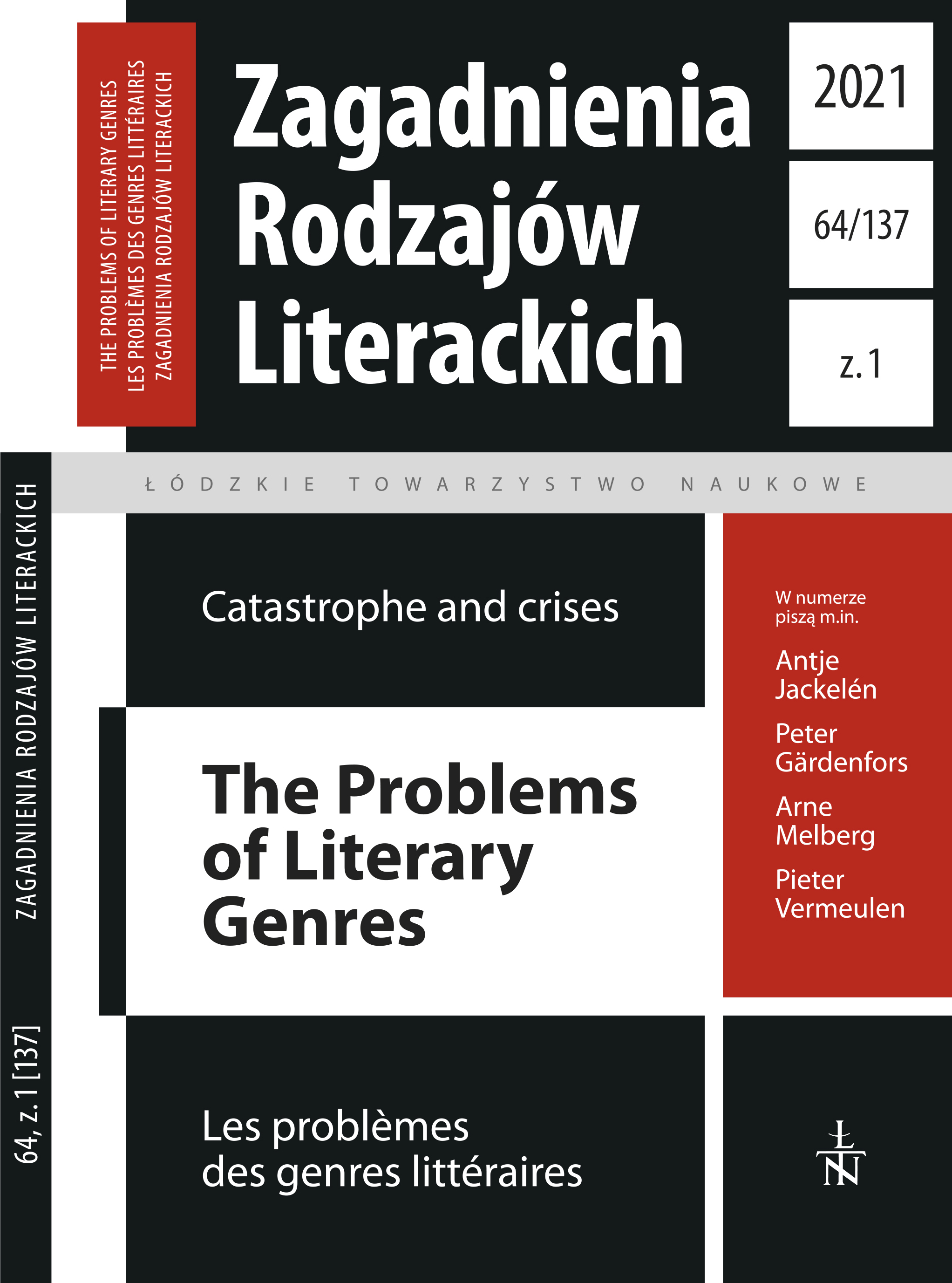Post-pandemic Nature, Crisis, Catastrophes and Their Metaphorical Discourses. Editorial Introduction
DOI:
https://doi.org/10.26485/ZRL/2021/64.1/1Słowa kluczowe:
metaphor, pandemic, crisis, climate change, discourses and genresAbstrakt
This article provides an extensive theoretical introduction to the main topic of the special issue of the journal. The authors aim at updating the metaphoric discourse on the environmental crisis and climate change in the time recently challenged by the global COVID-19 pandemic. Therefore, concerning the central theme of the journal’s issue, the authors review the “catastrophic criticism” developed in environmental humanities and ask how the perspective of depicting elemental nature has changed since modernity and its technological approach to the living world. Another question is what kind of metaphors are needed to reflect on the catastrophes and crises we face; and how the very concepts of crisis and catastrophe function as metaphors in the theories developed in response to the COVID-19 pandemic.
By reopening the question of agential nature distorted by crisis and catastrophe in a post-pandemic world, this article analyses the discursive and generic reappropriations of environmental risks, including the regional cultural background (e.g. the Chernobyl figure for CEE countries). An example which illustrates the irrelevance of nature theorized as a resource in modernity is taken from the canonical Question Concerning Technology by Martin Heidegger. It is followed up by critical Frankfurt School philosophers’ perspectives and is detectable in such environmentally loaded literature of Olga Tokarczuk’s. The authors’ findings show in this article how the pandemic realm has immensely repositioned how we read the leading theoreticians of catastrophic discourse. The examples are, e.g. Albert Camus or Oswald Spengler, and what texts we find relevant in the political, economic and social contexts of the debate on the contemporaneity of crisis and catastrophe, e.g. Niall Ferguson, Slavoj Žižek, Steven Pinker. In conclusion, this article draws on reopening the question on the role and authority of science in mitigating the climate and ecological crisis since the recent pandemic is an integral part of it.
Liczba pobrań
Bibliografia
Adorno Theodor (1997), Aesthetic Theory, ed. Adorno G., Tiedemann R., trans. R. Hullot-Kentor,
University of Minnesota Press, Minneapolis.
Barcz Anna (2020), Environmental Cultures in Soviet East Europe: Literature, History and
Memory, Bloomsbury Academic, London.
Bracke Astrid, Ritson Kate (2020), Water Rising, “Green Letters: Studies in Ecocriticism”, no. 1(24).
Camus Albert (1991), The Myth of Sisyphus and Other Essays, trans. J. O’Brien, Vintage Books, New York [Translation originally published by Alfred A. Knopf, 1955. Originally published in France as Le Mythe de Sisyphe by Librairie Gallimard 1942].
Coen Deborah R. (2021), Promoting a Culture of Climate Care, “Science”, no. 372, issue 6543 (14 May), p. 693, doi.org/10.1126/science.abi7088.
Craig David (2020), Pandemic and Its Metaphors: Sontag Revisited in the COVID-19 Era, “European Journal of Cultural Studies”, vol. 23, issue 6 (7 July), pp. 1025–1032, doi.org/10.1177/1367549420938403.
Donovan Josephine (2019), Ethical Mimesis and Emergence Aesthetics, “Humanities”, no. 8(2), p. 102, doi: 10.3390/h8020102.
Elemental Ecocriticism: Thinking with Earth, Air, Water, and Fire (2015), ed. Cohen J.J., Duckert L., University of Minnesota Press, Minneapolis.
Extinction Studies: Stories of Time, Death, and Generations (2017), ed. Rose D.B., van Dooren T., Chrulew M., Columbia UP, New York.
Ferguson Frances (1984), The Nuclear Sublime, “Diacritics”, 14, no. 2, pp. 4–10, doi.org/10.2307/464754.
Garrard Greg, Handwerk Gary, Wilke Sabine (2014), Imagening Anew: Challenges of Representing the Anthropocene, “Environmental Humanities”, no. 5.
Heidegger Martin (1977), The Question Concerning Technology [in:] The Question Concerning Technology and Other Essays, transl. W. Lovitt, Garland Publishing, New York–London.
Heise Ursula K. (2008), Sense of Place and Sense of Planet. The Environmental Imagination of the Global, Oxford UP, New York.
Hintz Marcin, Płuciennik Jarosław (2020), Patterns of Protestant Ethics and Modern Culture in Greta Thunberg’s Public Appearances, “Journal for the Study of Religions and Ideologies”, 19, no. 57, pp. 63–80.
Hundorova Tamara (2017), Gatunek czarnobylski: wyparcie realnego i nuklearna sublimacja, trans. P. Tomanek [in:] Po Czarnobylu. Miejsce katastrofy w dyskursie wspołczesnej humanistyki, ed. Boruszkowska I., Glinianowicz K., Grzemska A., Krupa P., Wyd. UJ, Kraków, pp. 55–66.
Lovelock James (2019), Novacene: The Coming Age of Hyperintelligence, The MIT Press, Cambridge (MA).
Material Ecocriticism (2014), ed. Iovino S., Oppermann S., Indiana University, Bloomington.
Mathieu Edouard, Ritchie Hannah, Ortiz-Ospina Eesteban et al. (2021), A global database of COVID-19 vaccinations, “Nature Human Behaviour”, www.nature.com/articles/s41562-021-01122-8 [access: 19.06.2021].
McNeill John Robert, Engelke Peter (2014), The Great Acceleration: An Environmental History of the Anthropocene since 1945, The Belknap Press of Harvard UP, Cambridge MA.
Morton Timothy (2013), Hyperobjects. Philosophy and Ecology after the End of the World, University of Minnesota Press, Minneapolis.
Morton Timothy, Boyer Dominic (2021), Hyposubjects. On becoming human, Open Humanities Press, London.
Oppermann Serpil (2010), The Rhizomatic Trajectory of Ecocriticism, “Ecozon@: European Journal of Literature, Culture and Environment”, no. 1, vol. 1.
Pinker Steven (2018), Enlightenment now: the case for reason, science, humanism, and progress, Viking, an imprint of Penguin Random House LLC, New York.
Sornette Didier (2009), Dragon-Kings, Black Swans and the Prediction of Crises, “International Journal of Terraspace Science and Engineering”, no. 2(1), pp. 1–18 [arxiv.org/abs/0907.4290and ssrn.com/abstract=1470006].
Spengler Oswald (2015), Man and Technics: A Contribution to a Philosophy of Life, Second edition, Arktos, London.
Taleb Nassim Nicholas (2008), The Black Swan: The Impact of the Highly Improbable, Penguin, London.
Thinking with Water (2013), ed. Chen C., MacLeod J., Neimanis A., McGill-Queen’s UP, Montreal.
Tokarczuk Olga (2003), Odra [in:] Moment niedźwiedzia, Krytyka Polityczna, Warszawa.
UN News (2020), news.un.org/en/story/2020/04/1062332 [access: 19.06.2021].
Weintrobe Sally (2021), Psychological Roots of the Climate Crisis: Neoliberal Exceptionalism and the Culture of Uncare, Bloomsbury Academic, New York–London.
Žižek Slavoj (2011), Living in the End Times, Verso, London–New York.
Žižek Slavoj (2020), Pandemic: COVID-19 Shakes the World, Polity Press, New York.







